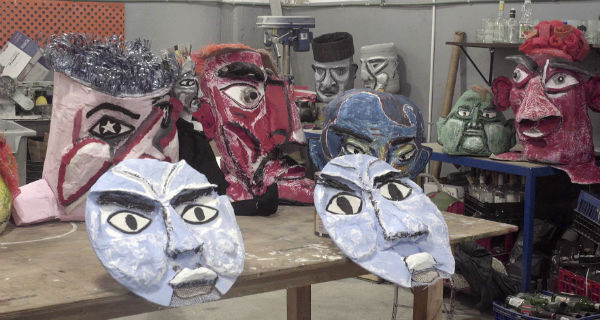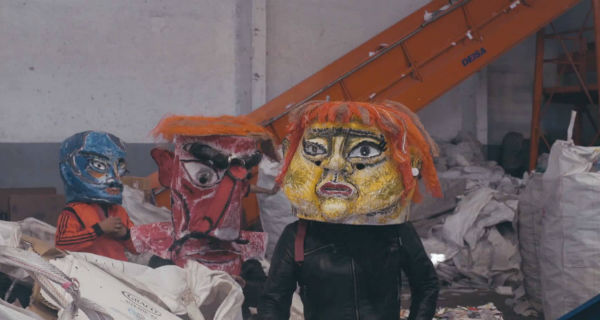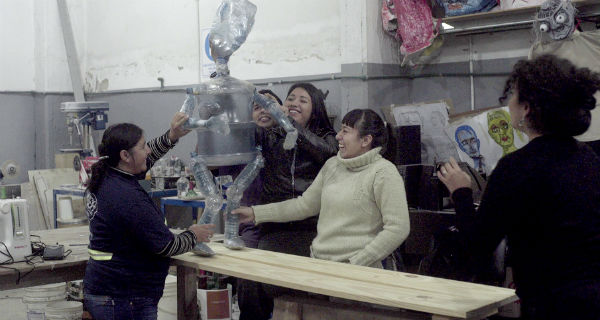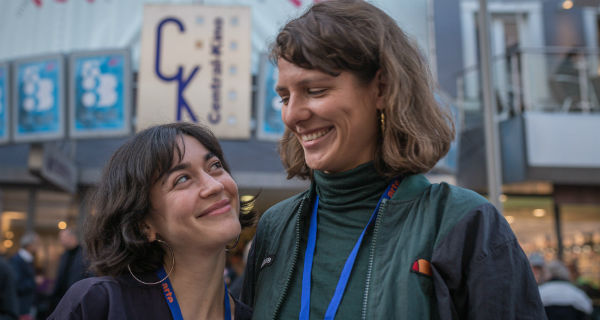“After the last depression in Argentina in 2001, 40 per cent of people live below the poverty line. In cities like Buenos Aires, people started to scavenge for recyclable material to earn their living. Since then the so-called Cartoneros have fought for acceptance in society... ”
So opens Mozart Recycled, Victoria Piczman and Britta Schoening’s documentary, a German production which had its international premiere at the 41st Cairo International Film Festival (20-29 November). At its heart is the alarmingly growing community of Cartoneros (or “cardboarders”), some 10 thousand people who collect cardboard and other recyclable garbage on carts, usually after sunset, selling it to survive.
They recall Cairo’s 18 thousand-strong community of Zabalin who have collected, sorted and recycled the city’s garbage since the 1940s while living in deplorable conditions, often deprived of fresh water and subject to academics.

Still from Mozart Recycled (Photo: Mozart Recycled Facebook page)
Both communities are essential to the urban ecosystem of which they are part, yet they live unhappy, uncertain lives with no prospect of change. Under such circumstances art is more often than not deemed irrelevant. But, following the Argentinian-Swiss puppeteer Frida Leon’s project of creating a small opera performance with the cardboard people as its characters and the production crew, the 75-minute documentary rejects this line of thought.
Leon brings the Cartoneros’ work back to them with puppets made using their recycling skills. They then learn to become puppeteers, costume designers, stage managers and, together with the Argentinean opera students, create a full show that presents the life of Wolfgang Amadeus Mozart. Eventually their success in Buenos Aires takes them to the stage of the Swiss opera house.
Some of Mozart’s melodies may be familiar to the community, which generally appreciates music. But why an opera on the composer’s life? Wouldn’t some aspect of Argentinian pop culture have spoken more urgently to the subjects? But, as the film shows, the project is precisely about how to approach and use art; and the success of the puppet opera demonstrates that the Cartoneros’ prior familiarity with Mozart is irrelevant.
Documenting the making and performances of the opera in Argentina and Switzerland, Mozart Recycled is a story of hope brought to people who have all but lost it. Piczman and Schoening shed light on Cartoneros while Leon turns them into artists, and the result is far-reaching.

Still from Mozart Recycled (Photo: Mozart Recycled Facebook page)
The directors pay little attention to the opera singers who support the production. They focus instead on two Cartoneros.
Cristina Montiel is a would-be seamstress trapped in her responsibilities as a wife and mother, but the project allows her to rediscover her passion, becoming its costume designer. In one touching scene, she is seen crying with joy and pride backstage. Likewise Facundo Alberto Gomez, a man in his twenties working hard to make ends meet and surrounded by drug abuse, is able to rediscover hope and love. They both revive their dreams and unearth emotions buried under layers of plastic and cardboard.
“Returning from Switzerland to Buenos Aires was like returning to daily struggles, the fights at home day by day,” Montiel, who was married at 15 and was never free of the control of a large family, explains. But, changed by the experience, she adds, she has finally found strength and a sense of independence. “Everybody asks me, ‘What happened to you?’” she reveals. She hopes to open her own tailoring workshop and is eager to finish her design studies. In her own words, Montiel would like to start from the beginning and catch up on what she missed.
For Gomez, the changes are equally significant, with many realistic opportunities at his age. The creative journey and trip to Switzerland opened his eyes on the importance of education as a tool for a better future; he has returned to school in Buenos Aires to take English. Having discovered a knack for hairdressing during the opera production, he is undecided whether to enroll in a hairdressing course or embark on a career as a car AC mechanic. “Both are good jobs,” he tells his girlfriend a year after Mozart Recycled.

Still from Mozart Recycled (Photo: Mozart Recycled Facebook page)
The protagonists represent two different generations, but Montiel and Gomez are both examples of minds redirected. If Gomez’s new mindset has a bigger chance to benefit his own life, Montiel’s revelation could direct her children to a brighter future.
Mozart Recycled oscillates between an older generation clinging to memories of better times and a younger one that has seen no better than the Cartonero lifestyle and are vulnerable to drug abuse. But the experience demonstrates how a creative initiative not only affects both categories of person but also brings them together. Art can reshape minds and if the results are not immediately palpable, future generations will still benefit from their parents’ altered ways of thinking. It is the matter of persistence and frequency.
Mozart Recycled is one of many films that show how art can transform people. While the directors capitalise on the human aspect of Cartoneros, showing their struggles, they do not fall into the trap of humanitarian sloganeering or images that generate pity.
They use minimal tools to embellish their production, as if cautious not to interfere too much in the raw reality surrounding the characters. Apart from the Mozart excerpts used in the opera itself, music by Juan Belvis gently supports the action, never imposing itself too much.
Expecting no reward, Piczman and Schoening present life as it is. They do not force an opinion on you, but provide all that you need to draw your own conclusions.

Directors of Mozart Recycled, Victoria Piczman and Britta Isabel Schoening. (Photo: Mozart Recycled Facebook page)
*A version of this article appears in print in the 19 December, 2019 edition of Al-Ahram Weekly.
Short link: